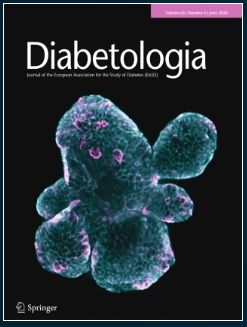Biomarkers of inflammation and improvement in depressive symptoms in type 1 and type 2 diabetes: differential associations with depressive symptom clusters.
IF 10.2
1区 医学
Q1 ENDOCRINOLOGY & METABOLISM
引用次数: 0
Abstract
AIMS/HYPOTHESIS People with diabetes and depression show large heterogeneity in their response to depression treatment. This study aimed to identify biomarkers of subclinical inflammation that were associated with improvement of depressive symptoms in people with type 1 diabetes and type 2 diabetes. METHODS The prospective analysis combined data from three studies (DIAMOS, ECCE HOMO and DDCT). A total of 332 people with type 1 diabetes and 189 people with type 2 diabetes completed both the baseline and 1 year follow-up examinations. Depressive symptoms were assessed using the Center for Epidemiological Studies depression scale (CES-D). Associations between baseline serum levels of 76 biomarkers of inflammation and 1 year changes in depressive symptoms were estimated using multiple linear regression. RESULTS In people with type 2 diabetes, higher levels of 26 biomarkers were associated with greater reductions in depressive symptoms (β=0.128 to 0.255; p<0.05), whereas in people with type 1 diabetes, higher levels of 13 biomarkers were linked with lower reductions in depressive symptoms (β=-0.189 to -0.094; p<0.05). A significant effect modification was observed for 33 biomarkers (pinteraction<0.05). The positive associations in type 2 diabetes were strongest for improvements in cognitive-affective and anhedonia symptoms, while the inverse associations in type 1 diabetes were strongest for improvements in somatic symptoms. CONCLUSIONS/INTERPRETATION Higher baseline levels of multiple biomarkers of inflammation were associated with greater depression reduction in type 2 diabetes but lower depression reduction in type 1 diabetes. There were also diabetes type-specific differences in the associations with symptom clusters of depression. This suggests that different inflammation-related pathways may be relevant for the response to depression treatment in people with type 1 diabetes or type 2 diabetes.1型和2型糖尿病患者抑郁症状的炎症和改善的生物标志物:与抑郁症状群的差异关联
目的/假设糖尿病和抑郁症患者对抑郁症治疗的反应存在很大的异质性。本研究旨在确定与1型糖尿病和2型糖尿病患者抑郁症状改善相关的亚临床炎症的生物标志物。方法前瞻性分析结合3项研究(DIAMOS、ECCE、HOMO和DDCT)的数据。共有332名1型糖尿病患者和189名2型糖尿病患者完成了基线和1年随访检查。使用流行病学研究中心抑郁量表(CES-D)评估抑郁症状。使用多元线性回归估计76种炎症生物标志物的基线血清水平与抑郁症状1年变化之间的关联。结果在2型糖尿病患者中,26种生物标志物水平较高与抑郁症状减轻程度较高相关(β=0.128 ~ 0.255;P <0.05),而在1型糖尿病患者中,13种生物标志物水平较高与抑郁症状减轻程度较低相关(β=-0.189至-0.094;p < 0.05)。33项生物标志物显著改变(p <0.05)。2型糖尿病患者在改善认知情感和快感缺乏症状方面的正相关最强,而1型糖尿病患者在改善躯体症状方面的负相关最强。结论/解释:较高的炎症多种生物标志物基线水平与2型糖尿病患者抑郁程度降低相关,但与1型糖尿病患者抑郁程度降低相关。在与抑郁症状群相关的糖尿病类型上也存在差异。这表明,不同的炎症相关途径可能与1型糖尿病或2型糖尿病患者对抑郁症治疗的反应有关。
本文章由计算机程序翻译,如有差异,请以英文原文为准。
求助全文
约1分钟内获得全文
求助全文
来源期刊

Diabetologia
医学-内分泌学与代谢
CiteScore
18.10
自引率
2.40%
发文量
193
审稿时长
1 months
期刊介绍:
Diabetologia, the authoritative journal dedicated to diabetes research, holds high visibility through society membership, libraries, and social media. As the official journal of the European Association for the Study of Diabetes, it is ranked in the top quartile of the 2019 JCR Impact Factors in the Endocrinology & Metabolism category. The journal boasts dedicated and expert editorial teams committed to supporting authors throughout the peer review process.
 求助内容:
求助内容: 应助结果提醒方式:
应助结果提醒方式:


